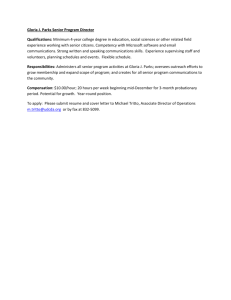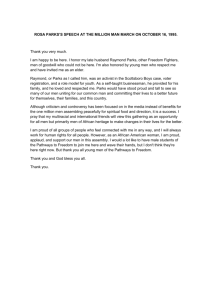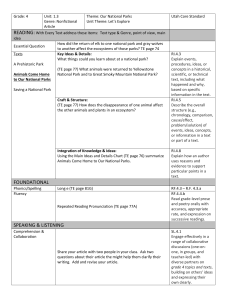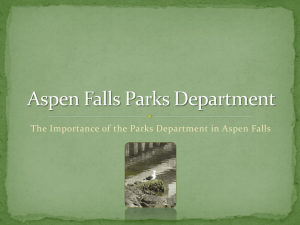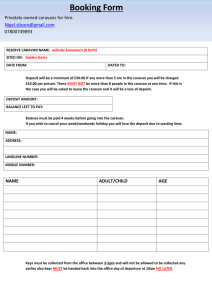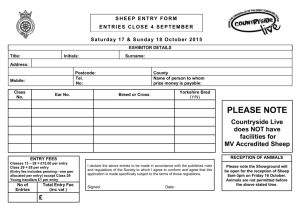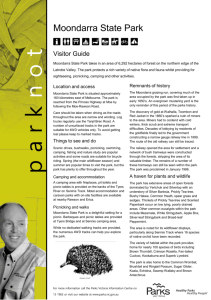Victorian Caravan Parks Association (DOC 106kb)
advertisement
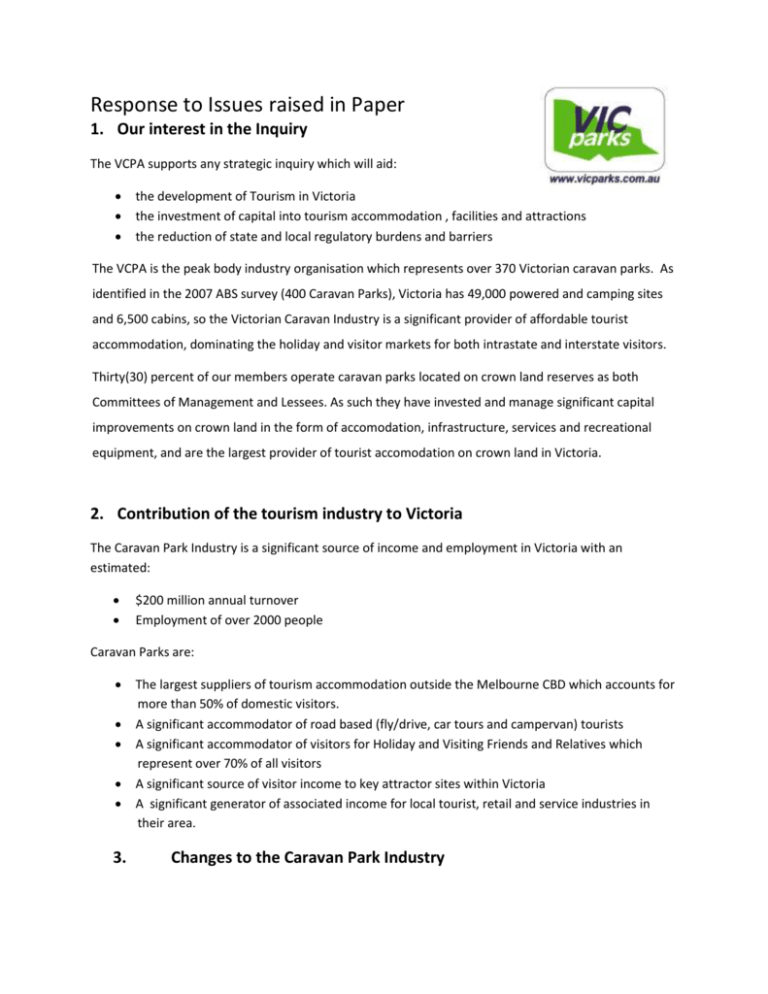
Response to Issues raised in Paper 1. Our interest in the Inquiry The VCPA supports any strategic inquiry which will aid: the development of Tourism in Victoria the investment of capital into tourism accommodation , facilities and attractions the reduction of state and local regulatory burdens and barriers The VCPA is the peak body industry organisation which represents over 370 Victorian caravan parks. As identified in the 2007 ABS survey (400 Caravan Parks), Victoria has 49,000 powered and camping sites and 6,500 cabins, so the Victorian Caravan Industry is a significant provider of affordable tourist accommodation, dominating the holiday and visitor markets for both intrastate and interstate visitors. Thirty(30) percent of our members operate caravan parks located on crown land reserves as both Committees of Management and Lessees. As such they have invested and manage significant capital improvements on crown land in the form of accomodation, infrastructure, services and recreational equipment, and are the largest provider of tourist accomodation on crown land in Victoria. 2. Contribution of the tourism industry to Victoria The Caravan Park Industry is a significant source of income and employment in Victoria with an estimated: $200 million annual turnover Employment of over 2000 people Caravan Parks are: 3. The largest suppliers of tourism accommodation outside the Melbourne CBD which accounts for more than 50% of domestic visitors. A significant accommodator of road based (fly/drive, car tours and campervan) tourists A significant accommodator of visitors for Holiday and Visiting Friends and Relatives which represent over 70% of all visitors A significant source of visitor income to key attractor sites within Victoria A significant generator of associated income for local tourist, retail and service industries in their area. Changes to the Caravan Park Industry Traditionally, camping and caravanning activities have always represented affordable family holiday accommodation. In recent decades, the growth of an emerging market of more discernible customers has revolutionised the industry. In particular, the baby-boomers now enjoying retirement, and doubleincome families with time constraints, now demand a higher level of facilities when they holiday. This has led to an exponential growth in luxury self-contained cabin-style accommodation with all mod-cons available, and in luxury recreational vehicles that carry all the features of a mobile home. Customer demand has also resulted in caravan and camping parks that provide swimming pools, playgrounds for children, and communal leisure features for all. Increasingly, parks now cater for a diversity of accommodation options that include traditional camping and caravanning sites using shared toilet and shower facilities, self-contained cabins, and large self-contained recreational vehicles with special waste dumping and parking requirements 4. Barriers to further development of the tourism industry The Caravan Park industry is a low density affordable provider of tourist accommodation and as such requires large land areas but does not support large staff numbers. Accordingly it is faced with a number of regulatory and financial barriers to development. New Parks The development of new caravan parks in Victoria over the past decade has been dominated by residential (Manufactured Home Estates) rather than Tourist parks for various reasons: Land Values – the increased land values over the past decade has seen many privately owned parks being purchased for highest and best value (i.e. land value rather than going concern value) and as such we have seen a net decline in park numbers and in turn in site numbers. Developers have seen the opportunity to acquire large holdings (normally between 4 and 20 acres) in sought-after locations, with most improvements being relocatable dwellings. Financial Returns – Going Concern values of caravan parks in Victoria have been limited by occupancy rates which have remained at approximately 50% for Tourist Parks. Residential Parks have the ability to secure a higher return by securing regular cashflows from close to 100% occupancies and reducing costs by requiring less staff and limited working capital as dwellings are often privately owned. Accordingly, proposals for new parks have provided inadequate returns as: Land Values – large land parcels in central locations are generally price-prohibitive Land Zonings – to avoid high land values, one must consider land parcels outside residential boundaries which often have rural zoning;s generally councils are not supportive of caravan park proposals in such 2|Page Submission from the Victorian Caravan Parks Association – Inquiry Into the Victorian Tourism Industry zones. This is evidenced by recent proposed Mornington Planning amendment C133 which seeks to redefine what should be the nature of a caravan park situated in the Green Wedge Zone. It proposes limits on the number of sites (100); the number of “built form” (cabins, annuals & residents) to 15; maximum cabin size of 60 m2; minimum land size of 40 hectares; distance from urban boundary of at least 2 km. Development costs – infrastructure costs for caravan parks are estimated at $30,000 per site with such costs regularly increasing with additional regulatory requirements for CFA, EPA, and Councils. Unregulated Competition – all proposals must factor in the constant attacks by special interest groups demanding the right to choose where they camp in Victoria without any consideration for their impact on the environment or the degradation of public land. Proposals have included allowing free camping in road-side rest areas, show grounds and school ovals, all of which compromise public safety, public liability risks and environmental quality whilst imposing additional unrecovered costs for cleaning and maintaining such sites. Established Parks The supply of established parks is diminishing due to: Land Values – At some point all operators will look to realise their investment and retire. At this point they will maximise their sale price as this represents their retirement nest egg and often with escalating land values such sales are for land value rather than as a going concern. Operator Fatigue – the decision to sell is often as a result of fatigue accumulated from: o operating a 24/7 business dealing with the public, 99% of whom are rewarding but the 1% of problematic guests can fully counterbalance the 99%. o Increased regulatory burden imposed by State and Local Government regulation. o Significant commercial risks, which cannot all be insured against. o Small staff numbers, as many Caravan parks cannot support large staffing costs, the burdens of problematic guests and increased regulatory burdens cannot be shared for dilution. Regulatory Barriers As identified in the options paper, there are many regulations affecting the development and operation of tourism businesses in Victoria and they are intended to deliver benefits to the community, however, it is the cumulative impact of regulation on small businesses with limited human and financial resources which is of greatest concern. Furthermore, it seems that much of the regulation is aimed at solving specific problems but applied globally rather than specifically. The following areas are of greatest concern to the Victorian Caravan Parks Association: 3|Page Submission from the Victorian Caravan Parks Association – Inquiry Into the Victorian Tourism Industry Land Use Regulations – the proposed Mornington Planning amendment C133 is a major barrier to the future development of Caravan Parks as land values in tourist precincts deem the only possible location of new parks may be in zones where Caravan Parks are either not a permitted use or require a long and complex legal challenge to gain a permit. Building Regulations –In Victoria, caravan parks are regulated by the Victorian Residential Tenancies Act 1997 and the Residential Tenancies (Caravan Parks and Movable Dwellings Registration and Standards) Regulations 2010. The Regulations have recently been amended and as such operators and regulators alike are still digesting some changes. The regulations govern (amongst other things) the installation of movable dwellings (Caravans and Unregistered Movable Dwellings) within parks, however, some councils have imposed additional requirements for planning permits which again add time and complexity to the upgrading of accommodation within parks. This requirement is superfluous given that parks have had to comply with such planning requirements at initial approval stages. Such delays have resulted in accumulated holding costs, as parks have outlaid for dwelling acquisitions and have been awaiting approvals for more than 6 months with the likelihood that they not be able to honor bookings accepted for the busy Christmas and holiday period. Liquor Licensing – in an attempt to control problematic venues, the tightening of liquor laws was globally applied and fortunately some concessions have since been granted. Caravan Parks in general only have Liquor Licences to facilitate the provision of wine-on-arrival accommodation packages and sales of small packaged alcohol for consumption of guests at their site / cabin. Recent exemptions were granted to Bed & Breakfast accommodation with 8 rooms or less, however, larger Bed & Breakfast venues and Caravan Parks have been overlooked and burdened with hefty fee increases and additional licensing criteria. Crown Land Caravan Parks – the impact of regulatory burden on Crown Land Parks shall be addressed in Section 5 - Management of State Assets. Food Handling Compliance – Often Caravan Parks offer small kiosks that generally only sell prepackaged low risk foods, however, are required to complete various daily and weekly forms/ registers despite being categorised as the lowest level except for the fact that they sell pre-packaged bacon and eggs (a BBQ favourite of campers). WorkCover – the underlying principle of WorkCover is very honourable and necessary to ensure staff are covered in the event of workplace injury. However, most caravan park staff are performing manual handling tasks of grounds-keeping and cleaning of accommodation, amenities and facilities and are subject to some claims that can be either questionably linked to the workplace or are caused by worker negligence. A no- blame system similar to that which TAC applies to transport accident claims would eliminate the costs associated with determining blame and the costs of determining appropriate 4|Page Submission from the Victorian Caravan Parks Association – Inquiry Into the Victorian Tourism Industry compensation could be eliminated with the replacement of lump sum compensation with pension payments for the term of the injury. CFA Regulations – as per Building Regulations above, the Victorian Residential Tenancies Act 1997 and the Residential Tenancies (Caravan Parks and Movable Dwellings Registration and Standards) Regulations 2010 refer to CFA Caravan Park Fire Safety Guidelines. As the guidelines are flexible in their application to established parks, they are subject to differing interpretation by Council and CFA officers and are further complicated where staff within either department change. Often, much liaison is required to demonstrate to officers that performance standards are appropriate for established parks rather than the prescriptive standards. Water Usage Affordable Housing & Metering Costs - Domestic v Commercial Use Water Maps are designed to apply to “Industrial and Non-Residential Water Users”. The Caravan Park industry caters exclusively for residential users as our consumption is residential and domestic. i.e. Showers, toilets, urinals and laundry. (Many Parks have existing trade waste agreements for laundries.)Showers are the highest users of water in caravan parks and the best approach to reduce water consumption with showers is to use water saving heads and restrictors. Caravan Parks are of a hybrid nature catering for many different forms of affordable accommodation including camping, annuals, cabins and residents alike. Many of these forms of accommodation are privately owned and the cost to individually meter sites would be astronomical to Park owners and their customers alike. Industry Self Regulation Many Parks are accredited under the National Accreditation scheme and this requires Park operators to record usage, perform regular checks and apply water saving measures. Many Parks in the Geelong region are also Waste Wise, Green Globe Accredited, Blue Gum. etc This seems inconsistent with the State Government promoting a goal to reduce red tape and compliance burden on business. Total Usage as a Trigger Point The use of a total usage threshold (10ML or 5ML) does not recognize the number of Guests/Residents visiting a Park throughout the year and as such a more appropriate measure for accommodation providers would be a ltrs/Guest nights. Lack of recognition of Historical Efficiency Gains Most Parks have been applying water saving measures over the past 10 years with the stringent water restrictions in place, and the increasing cost of water; it is hoped Parks are not required to generate further large scale water savings if we have already achieved wholesale efficiencies Lack of Assistance & Capital Limitations 5|Page Submission from the Victorian Caravan Parks Association – Inquiry Into the Victorian Tourism Industry In other states of Australia (eg, Queensland), businesses were provided with considerable assistance (consultants) to prepare Maps and provide advice. SME’s do not have staffing resources and structures that can absorb the increasing compliance burdens. Most SME’s have been applying water saving measures, educating guests and recording consumption but the preparation of a Map is very timeconsuming and to apply more sophisticated measures requires expertise and considerable capital. In Summary: The impact of increasing regulation in the current Caravan Park Industry. The current environment for new developments is already heavily burdened with high costs and lack of availability of debt funding, and the difficulty in finding affordable development sites, so the uncertainty and delays caused by regulation are increasing the number of parks being sold for redevelopment and reducing the number of new tourist parks. Accordingly the supply of affordable tourist accommodation is shrinking in Victoria. With record numbers of new caravan sales (Victoria is the largest producer of Caravans in Australia) and the retiring baby-boomers ensuring the trend continues, all factors which discourage the increased supply of sites in Victoria should be heavily scrutinised. The above factors contribute to the current lack of growth in the development of further camping and caravanning parks This lack of growth has two (2) major impacts: 5. It limits opportunities for affordable holidays for travelling families and groups, particularly at times of peak demand such as school holidays –many parks have long wait lists. It limits the source of potential income to operators of local tourist features, and to local retailers and associated businesses that would benefit from additional visitor numbers Opportunities to improve the management of State assets Caravan Parks & the management of State assets There are 175 Crown Land Caravan Parks in Victoria with approximately 60% being VCPA members, and as such 30% percent of all VCPA members operate caravan parks located on crown land reserves as either Committees of Management or Lessees. Accordingly they have invested and manage significant capital improvements on crown land in the form of accomodation, infrastructure, services and recreational equipment, and are the largest provider (by number of guests) of tourist accomodation on crown land in Victoria. 6|Page Submission from the Victorian Caravan Parks Association – Inquiry Into the Victorian Tourism Industry All Caravan Parks (both Private and Crown Land) have a vested interests in the efficient management of State assets and tourism infrastructure as both accommodators of visitors and beneficiaries of well managed natural assets and attractions. DSE have identified the options for Caravan Park Management on Crown Land as: o Direct Management via Committees of Management (COM) o Contracted Park Management - experienced park Managers are appointed to provide management services to the COM which can deliver savings as entrepreneurial contractors are more prepared to work the longer hours required to ensure a park’s success. o Leased Caravan Parks – experienced park operators are appointed as tenants and can provide benefits to the COM as they remove the burdens of operating (maintenance and repairs), remove the risk of operating loses, and provide capital investment in park infrastructure and promote professional management skills and experience, therby improving amenity to park visitors. Regulatory Barriers The impact of regulation within Crown land Parks is incremental to the burdens identified in Section 4 and can vary depending upon the type of management. Parks with Direct and Contracted Management – In 2010, DSE developed “Policy Statement – Improving Equity of Access to Crown Land Caravan and Camping Parks” and “Best Practice Management Guidelines – for Committees of Management Managing Caravan and Camping Grounds on Crown Land” in response to the Caravan and Camping Parks on Coastal Crown Land Reference Group Report (2006) which was established in response to community concerns about access to caravan and camping sites. The policy and guidelines apply to COM direct and contract managed parks form May 2010 and to Leased parks from their next lease. The objectives of the Policy and Regulations are genuine however due to the inclusion in the reference Group of only COM managed Coastal Crown Land parks they have unnecessarily burdened all Crown Land Parks as follows: - Best Practices to ensure improved equity of access already in practice by professional COM’s, Lessee’s and private operators were not taken into account and as such some practices are not appropriate, nor are they Best Practice. - Some prohibitions within the Policy and Guidelines are problematic, inappropriate, compromise safety and are a degradation of current practices. - Many of the guidelines are developed for large operations and cannot be applied or administered by smaller parks, many of which are operated by volunteers and husband and wife operators 24/7. 7|Page Submission from the Victorian Caravan Parks Association – Inquiry Into the Victorian Tourism Industry - - Many Guidelines impose considerable burdens on operators in areas which have nothing to do with “equity of access” the purpose of the policy. The policy of prohibiting permanent residency in Crown Land Caravan Parks has been illresearched and has caused much angst amongst the existing low income residents in Crown Land Parks across the state and the staff and lessees that operate them. The requirement for all COMs to regularly report to DSE demonstrating the implementation of the policy is a major bureaucratic burden with little benefit. Fundamentally, the Guidelines are not best practice and therefore create inefficiencies in the way that state assets are managed and maintained which in turn has a negative impact on Victorian Tourism. Leased Caravan Parks – As outlined above, the Policy and Guidelines are well meaning but do not represent best practice and are a considerable burden on Lessees thus impacting on the value of their businesses. DSE state in their Guidelines that the reason parks are leased to experienced park operators is that they: - remove the burdens of operating (maintenance and repairs) - remove the risk of operating loses, and - provide capital investment in park infrastructure and - promote professional management skills and experience, thereby improving amenity to park visitors. Their efforts to improve Equity of Access will achieve the same outcome that lessees already enjoy so it is not necessary to provide prescriptive guidelines which will burden Lessees with inefficient practices which may breach the tenant’s right to peaceful enjoyment and possibly restrictions of trade. This in turn will discourage professional operators from acquiring Crown Land Leaseholds and capital investment in park infrastructure. Many Crown Land parks have ageing infrastructure, amenities and facilities and the loss of professional operators will have a negative impact on Victoria’s Tourism Industry. RECOMMENDATION 1 That the regulatory frameworks that affect the further development of additional camping and caravan parks be reviewed 6. Other opportunities to expand the Victorian tourism industry 6.1 Integrated Promotional Campaigns 8|Page Submission from the Victorian Caravan Parks Association – Inquiry Into the Victorian Tourism Industry The high cost of promotion of affordable holidays in Victorian camping and caravan parks via print and electronic media deters individual park owners, and this association, from undertaking a regular program of advertising and promotion of tourist destination and features. The Victorian Caravan and Parks Association is very grateful for the support it receives from Parks Victoria that contributes to the cost of printing and distribution of an Annual Guide that lists over 200 caravan , cabin and holiday parks throughout Victoria. But there is need for high-level financial support for a regular program of promotion on television and in newspapers and magazines, to match that of interstate tourist promotions. Such a program should advertise a wide variety of leisure, fun and lifestyle activities to be enjoyed in key tourist destinations in Victoria across all seasons. RECOMMENDATION 2 That financial support be allocated towards an integrated program of print and electronic media promotion of holidays in camping and caravan parks around featured tourist destinations in Victoria 6.2 Collection and analysis of reliable data on visitor use of camping and caravan parks in Victoria The Australian Bureau of Statistics no longer collects data on the number, frequency or duration of stay of holiday visitors to camping and caravan parks. Such data as is available from park business owners or lessees is piecemeal and unreliable. Planning for growth depends on reliable park visitation and wider tourism travel data. RECOMMENDATION 3 That ABS data be collected on: Number, frequency and duration of holiday visits Start-end journey details of travellers Use of forward-booking opportunities Indication of visitor preference for on-site facilities to be provided by the park owner 9|Page Submission from the Victorian Caravan Parks Association – Inquiry Into the Victorian Tourism Industry

